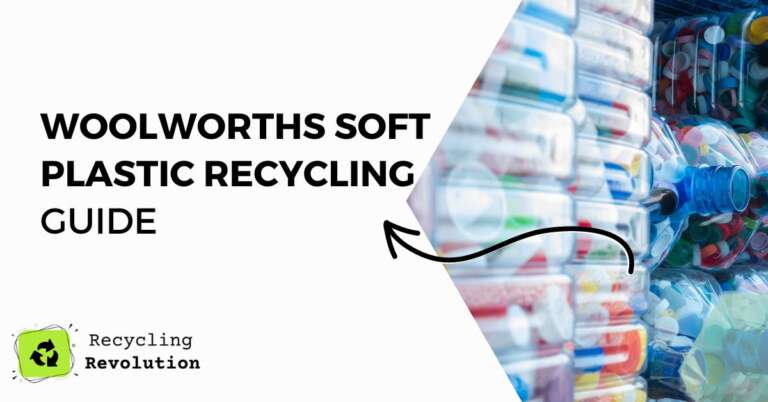Kerbside recycling for most households in Australia is now limited to glass, clean paper and plastics. This means that soft plastics like chip packets and food wrappers are no longer collected from the kerbside with the rest of your recycling.
That’s why millions of people turned to Woolworths for soft plastics recycling. Woolworths is one of the world’s largest supermarket chains and one of Australia’s most trusted brands with more than 90 years of experience delivering groceries across the country.
Following concerns raised by industry, government and the community that many people were dumping soft plastics in their recycling bins – even though they couldn’t be recycled through kerbside services like other household waste – Woolworths made a commitment to recycle soft plastics collected from its Australian stores.
🧴 Plastic Recycling Estimator
🔍 Plastic Buyback Facts
Most buyback programs accept PET (water bottles), HDPE (detergent containers), and PP (caps, cups). Light plastics like bags and wrappers are harder to recycle, but containers and jugs are highly valued. Recycling plastic reduces landfill overflow and saves fossil fuels.
What is the Woolworths soft plastics recycling program
Woolworths established a program for soft plastics with the aim of diverting soft plastics from landfills. The impact plastics have on the environment is well-known and documented. Its virgin production from oil, gas and coal consumes a large amount of energy and its disposal into landfill generates significant amounts of greenhouse gases.
And when any type of plastics is disposed of haphazardly, it causes significant pollution. As a matter of fact, plastics have already been found inside seabirds, whales and dolphins. The result is that plastic pollution kills an estimated 1 million marine animals every year.
The Woolworths soft plastics recycling program was a small step towards mitigating plastic pollution in our environment. It was the only program in the entire country where soft plastics could be recycled at no cost. Woolworths positioned recycle bins in all of its stores where soft plastics could be placed out for collection. Consumers were allowed to drop off their plastic bags, bubble wrap, frozen food packaging, pet food bags, sanitary packaging and more.
And when you think about it, it is a great initiative. It means that you don’t have to worry about the problem of plastic bags polluting our environment, and potentially choking marine life.
Why Woolworths stopped the soft plastics recycling program?
Unfortunately, this program was suspended back in 2022 after it was discovered that REDcycle allegedly wasn’t recycling soft plastics. The business reportedly stockpiled millions of plastics in various warehouses across the country.
Woolworths has been continuously looking for ways to sustainably manage and recycle soft plastics. They are also investigating other options to offer a soft plastics recycling service to its customers. In the meantime, it is apparent that the infrastructure for kerbside soft plastics recycling is insufficient in Australia. There is a lot more plastic being produced than there are facilities to recycle it.
Currently, Woolworths is no longer collecting soft plastics from its stores. The business has even removed the REDcycle bins from its supermarkets. With a decrease in soft packaging usage, it seems that the logical next step is to phase out soft plastic packaging altogether. In fact, Woolworths is encouraging consumers to bring their own shopping bags and reuse where possible.
Fortunately, there are a couple of things you can still do. If you have soft plastics that cannot be included in the recycling, try to recycle them at community recycling centres. Some local councils are set up for this purpose and are open on certain days for people to drop off their plastic bags, bottles, bins, etc. In addition, you can also opt to use reusable bags. There’s no damage in giving it another go after a failed attempt with a plastic bag.
Alternative Recycling Programs
There are other alternatives to the now defunked Woolworths recycling program and they include the following.
- Terracycle: This company offers a range of recycling solutions for hard-to-recycle materials, including soft plastics. They partner with businesses, communities, and governments to collect and recycle materials that would otherwise end up in landfills.
- Local Councils: Many local councils in Australia have their own recycling programs that accept soft plastics. You can contact your local council to find out more information.
- Plastic Bank: This organization, which has recycling centers in developing countries, accepts plastic waste in exchange for digital currency that can be used for buying necessities.
- Return and Earn: This is a container deposit scheme, which is a state-based scheme in New South Wales, Queensland, South Australia, and the Australian Capital Territory. It encourages people to return their empty drink containers, including plastic bottles and cans, to receive a 10 cent refund.
- Plastic-Free July: This is a global movement that encourages individuals, communities, and businesses to reduce their use of single-use plastics during the month of July.
Final Thoughts
Woolworths opted to discontinue their soft plastics recycling program. There’s still hope for its return though as the business is reportedly investigating a number of other options for the collection and recycling of soft plastics.
Plastic waste is increasingly becoming an issue as our population increases exponentially. There needs to be more recyclers for the entire blow out of waste because it is a problem that is only going to get worse.
FAQs
What do i do with my soft plastics?
There are barely any recycling centers for soft plastics. As such, consumers are advised to throw them in the rubbish bin. But first contact your local council for information on where you can put your soft plastics.
What happens to soft plastics recycling Australia?
At the moment, REDcycle has paused its soft plastic recycling program. There aren’t any other options when it comes to this material and most of the councils won’t take them for recycling. Soft plastics tend to be difficult to sort and process during recycling.

